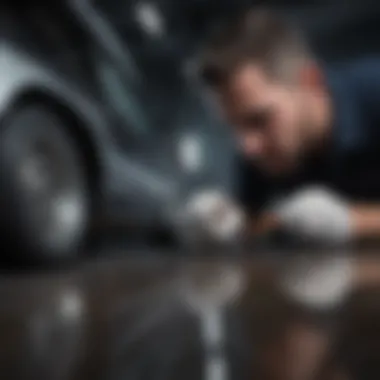The Best Oil Leak Treatment: Effective Solutions for Vehicles


Intro
Oil leaks in vehicles represent a significant challenge for car owners, affecting both performance and safety. Recognizing and treating these leaks promptly can provide a notable enhancement to a vehicle's efficiency. Understanding the root causes, identifying the signs, and employing effective treatment options is essential for every automotive enthusiast and consumer.
In this comprehensive guide, we will explore various methods of oil leak treatments available in today's market, as well as their effectiveness. Additionally, we will delve into routine maintenance practices that could help prevent future leaks, thus extending the, lifespan of a vehicle. Fascinating insights will be provided on advancements in technologies directly addressing oil leak issues.
As the automotive industry adapts to consumer demands, being informed about the best practices for managing such leaks is important. Whether you are a seasoned expert or a curious car owner, this article will aid in embracing a proactive approach concerning oil management and vehicle upkeep. » Let us delve deep into the dynamic landscape of automotive solutions and uncover effective strategies to tackle oil leaks.
Understanding Oil Leaks
Oil leaks can be a significant issue for vehicle owners. Understanding this topic is crucial for maintaining the health of your car. Oil serves as the lifeblood of an engine. It lubricates moving parts and helps regulate temperature. Any loss of oil can lead to decreased engine performance, increased wear, and severe damage over time.
Understanding the elements, benefits, and precautions connected with oil leaks gives vehicle owners a toolkit for early intervention. Recognizing that a car has an oil leak allows for tinely corrective measures, which can avoid potentially costly repairs. The first step in tackling an oil leak is detecting its presence and the reasons behind it. Once a leak is identified, appropriate methods of oil leak treatment can be applied.
What is an Oil Leak?
An oil leak occurs when motor oil escapes its designed pathways. This may happen due to a failure of various components, such as gaskets, seals, or specialized parts within the engine. When oil leaves the intended area, it pools under the vehicle or stains internal components. This unwanted loss not only affects the oil level but also compromises the overall performance of the vehicle. If not addressed, even small leaks can escalate into more significant issues, leading to repairs that may become complex and expensive.
Common Causes of Oil Leaks
There are several factors that can cause oil leaks in a vehicle, including:
- Worn Seals and Gaskets: Over time, the gaskets and seals can degrade and harden, which leads to oil seeping through.
- Overfilled Oil: Too much oil in the engine can increase pressure, causing seals to fail and oils to leak.
- Damaged Oil Pan: Impacts from road debris can cause cracks or dents in the oil pan, leading to oil loss.
- Faulty Oil Filter: If the oil filter is not functioning properly, it may allow oil to leak from the system.
A more comprehensive understanding of these causes not only helps in the diagnosis of the issue but also highlights important preventative measures.
Identifying Signs of an Oil Leak
Detection of an oil leak involves being aware of certain indicators. Common signs that suggest the presence of an oil leak include:
- Puddles or Spots: If you notice oily spots or puddles beneath your vehicle, it is a clear sign of an oil leak. The color of the oil can range from light brown to black.
- Oil Warning Light: A dashboard warning light lit up could suggest low oil levels, prompting a check for leaks.
- Burning Oil Smell: A distinct burning smell while driving may indicate that oil is leaking onto hot engine parts, burning up.
- Diminished Oil Levels: Regular depletion of oil levels with no visible leaks could suggest internal leaks.
Acting on these signs swiftly can help prevent severe complications that could endanger your vehicle’s operational capability.
A prompt response to signs of an oil leak not only enhances engine longevity but also ensures that dynamic performance is retained throughout the vehicle’s life span.
Impacts of Oil Leaks on Vehicles
Oil leaks are more than just an inconvenience; they can have profound effects on a vehicle's performance, safety, and financial standing. Understanding these impacts is crucial for automobile owners. Addressing oil leaks swiftly prevents further complications. In this section, we will cover the effects on engine performance, potential safety hazards, and financial implications, offering a nuanced examination of why this knowledge matters.
Effects on Engine Performance
An oil leak directly interferes with the engine’s lubrication system, which is fundamental for its operation. When oil drips out, the engine cannot maintain necessary lubrication levels. This leads to friction between moving parts, culminating in increased wear and tear. Furthermore, low oil levels can cause overheating and significant engine damage over time.
Symptoms of a loss of lubrication include:
- Unusual engine noises
- Sluggish performance
- Warning lights on the dashboard
Failure to address these issues may lead to catastrophic engine failure. A compromised engine requires extensive repairs, which not only procrastinates the enjoyment of your vehicle but can also be a source of unbearable stress and inconvenience.
Potential Safety Hazards
Oil leaks also pose serious safety risks. When oil accumulates on key vehicle components, such as brakes or tires, the chances of malfunction grow. Particularly on brake components, oil can reduce grip which results in elongated braking distances.


Furthermore, oil spills on the road can create dangerous driving conditions, increasing the likelihood of accidents. If a car stores oil in aging parts like gaskets, these areas become likely sources for hazardous spills that obstruct proper vehicle control.
- Consider the test and urgency of risks:
- Loss of braking power can jeopardize the safety of not only the driver but everyone on the road.
- Tire slipping from oil can worsen the ability to maneuver.
Such hazards make understanding and addressing oil leaks a priority for safe operation.
Financial Implications
Addressing oil leaks also involves considerable financial considerations. Initially, repairs can range from relatively inexpensive sealants to major engine overhauls. The longer one allowes the leak to persist, the higher repair costs may climb.
In addition to repair expenses, there’s the potential cost of rising fuel consumption. As oil mixes with other fluids, fuel efficiency suffers. Over time, this adds substantial unintended expense to your fuel bills.
Furthering the appearence of a vehicle with visible stains impact resale value. Everyone gravitates towards vehicles that exhibit great care and condition. Candidates might view an unattended leak as a reason to negotiate the vehicle price downward, affecting your investment return.
Addressing oil leaks as soon as they are recognized is essential to the integrity, safety, and economy of your vehicle. Neglect may ripple into multifaceted complications, leading to never ending torque of problems.
In summary, understanding the impacts of oil leaks is a fundamental aspect of maintaining vehicle performance, safety, and value.
Treatment Options for Oil Leaks
Treatment options for oil leaks are essential for anyone looking to maintain their vehicle's operation and performance. Various methods exist to address this issue effectively, and choosing the right approach can directly impact both short-term and long-term vehicle health. Recognizing whether a temporary or permanent solution is more suitable is crucial to resolving the issue effectively. Furthermore, a discussion regarding DIY treatments versus professional services can empower vehicle owners to make informed choices. The following subsections explore these numerous options and their significance for automotive enthusiasts and everyday drivers alike.
Temporary Solutions
Temporary solutions for oil leaks serve as a quick fix that can help manage the problem until a more comprehensive approach can be applied. They are invaluable for immediate relief against visible oil leaks. These solutions generally include:
- Oil Stop Leak Products: Often available in bottles, these additives can be poured directly into the engine oil. They are designed to swell and expand seals and gaskets. One popular product in this category is BlueDevil Oil Stop Leak, which is known for its quick action in sealing leaks.
- Rubber and Silicone Gaskets: Using some form of temporary gasket material allows vehicle owners to attend to leaks without extensive engine downtime. For instance, Permatex Ultra Black or Red RTV Silicone Gasket is widely used.
While these temporary methods are helpful, awareness of their limitations is necessary. They are not meant for long-term prevention, and relying on them repeatedly can cause more significant underlying issues.
Permanent Solutions
Unlike temporary fixes, permanent solutions imply a more significant commitment to maintaining the vehicle's integrity and performance. These methods may include substantial repairs or replacements that can eliminate leaks definitively. Common permanent solutions include:
- Gasket Replacement: Removing worn-out gaskets and replacing them is crucial for long-term reliability. Ingredients such as a new valve cover gasket or oil pan gasket can restore oil integrity.
- Seal Replacement: Engine seals can degrade over time; thus, replacing front and rear crankshaft seals may prevent leaks effectively.
- Full Engine Rebuild: This is often seen as the last resort for those facing chronic leaking and engine problems. While it is costly, it can significantly augment the lifespan of older vehicles.
These permanent solutions demand either significant time and effort or professional involvement. Understanding when to pivot from temporary to permanent solutions factors into prudent maintenance strategy.
Do-It-Yourself Treatments
Do-it-yourself treatments provide a hands-on approach for car owners eager to solve their oil leak issues independently. DIY methods can save a lot on labor costs while providing satisfaction from personal involvement. Common DIY treatments include:
- Tightening Loose Bolts: Simply checking hose clamps, bolts, and retaining devices allows localized leaks to be reduced or eliminated directly. Care should be taken, of course, not to over-tighten and risk breaks.
- Using Leak Repair Additives: Certain oil treatments specifically target seals ensure greater effectiveness. Many can be found at major retailers or automotive stores, such as the aforementioned BlueDevil.
- Cash Allowance for Regular Inspections: Devote time periodically to inspect vehicle for leaks catches issues before they develop into significant problems.
While DIY can often lead to substantial cost-saving, having adequate knowledge and resources focuses on delivering serious outcomes. Also, certain treatments demand multi-faceted understanding of vehicle mechanics.
Professional Repair Services
Despite the appealing nature of DIY solutions, professional repair services may sometimes be necessary, particularly for complicated leaks requiring specialized knowledge. Professionals can deliver an invaluable perspective absolving drivers of guesswork. Here are key aspects to consider:
- Expert Assessment: A trained mechanic can accurately identify root causes of leaks, which often are not apparent without extensive experience.
- High-Quality Tools: Professional services frequently employ tools prohibited to consumers assuring effective application of advanced solutions.
- Warranty: Many professional services come with a warranty, ensuring that any repeat issues with leaks are addressed without incurring further costs.


Professional services lessen the burden that comes with spotting problems. Know the right service for certain conditions saves both time and money inevitably.
Applying the correct treatment option can effectively resolve oil leaks, enhancing vehicle longevity and preventing further repairs.
Elemental Components in Oil Leak Treatments
Understanding elementel components in oil leak treatments is crucial for anyone looking to maintain vehicle performance or address leak issues effectively. Each component plays a significant role in preventing, identifying, or repairing oil leaks. Knowing these elements helps in selecting suitable solutions according to specific requirements.
Sealants and Additives
Sealants and additives are often the first line of defense against oil leaks. These products can create a temporary barrier that stops leakage. Sometime they are designed to rejuvenate seals, effectively fortifying older gaskets. They can work within the engine's oil circulation system, providing additional strength to seals and preventing future leaks from occurring.
- Benefits:
- Cost-effective initial solutions
- Easy application for do-it-yourself users
- Can be used alongside standard oil types
While sealants may offer a quick fix, over-reliance on them can cause complacency concerning actual mechanical problems. Therefore, their usage should be monitored and not viewed as a complete replacement for proper maintenance.
Gaskets and O-Rings
Gaskets and O-Rings are essential mechanical components within any vehicle engine's design that prevent leaks by providing a tight, secure seal between engine parts. Commonly found in areas like the oil pan, valve cover, and oil filter, they wear out over time due to heat and pressure, leading to potential oil seepage.
Choosing higher quality gaskets can reduce long-term maintenance costs and the chance of leaks. Regularly inspecting gaskets and O-rings is simpler than many expect.
- Considerations:
- Always match the right part to avoid future complications.
- Investing in more durable materials can yield better results and longevity.
Keep in mind that even a small O-ring failure can lead to significant leaks, hence regular inspections become paramount.
Engine Oil Types
The type of engine oil you use can have a profound impact on the seal integrity and overall performance of the vehicle. Different oils have varying properties, including viscosity levels that are critical for maintaining adequate lubrication. Choosing a compatible oil type can virtually eliminate the chances of leaks exacerbating due to improper lubrication.
- Key Points on Oil Types:
- Synthetic Oils: Provide better durability under extreme conditions, which helps maintain seal integrity.
- Conventional Oils: Often less expensive but could require more frequent changes.
- Hybrid Oils: Combine synthetic and conventional oils, often sought after for their balanced properties.
The proper oil choice goes beyond personal preference; it can directly influence the chances of developing oil leaks later on.
The interaction between these elemental components forms the foundation of effective oil leak treatment strategies. The knowledge of their roles further informs choices for proper vehicle maintenance.
Evaluating the Best Products for Oil Leak Treatment
Evaluating the right products for oil leak treatment is a vital step in addressing automotive oil leaks efficiently. This section provides insights into how to choose suitable solutions that cater to specific needs. Selecting effective products can enhance engine performance and extend the lifespan of automotive components. Many treatments on the market promise various actions. However, not all of them live up to these claims. This evaluation procedure can delineate credible options from those that are less effective. It contributes to informed decision-making while choosing the tools to mitigate oil leakage.
Criteria for Selection
When sifting through the multitude of oil leak treatments available, several criteria stand out to help with selection:
- Efficacy: The treatment’s ability to resolve the leak should be primary. Look for documented changes in performance by verified users.
- Safety: Products should be compatible with all engine components and not introduce harmful elements to the oil mixture.
- Application Process: Simplicity in how you apply a treatment can save time. Prefer products that come with clear instructions and manageable procedures.
- Compatibility: The selected treatment should mesh well with the oil type in use. Not every treatment is suitable for every type of vehicle or oil.
- Longevity of Results: Some products provide immediate relief but fail to offer long-term results. Evaluating the duration of effectiveness matters significantly.
Incorporating these criteria aids drivers and mechanics in choosing the most suitable options available in their respectives markets.


Top Commercial Products Reviewed
This list entails a few distinguished commercial products ideal for oil leak treatment:
- BlueDevil Oil Stop Leak: This solution helps rejuvenate seals and gaskets while stopping leaks at their source. Whether it's a small leak or a major dripping issue, this product secures the area effectively.
- Bar's Leaks Oil Seal: Known for its particular efficiency in gaskets needing reinforcement. Users often attest to its quick sealing capabilities when curbing oil losses.
- Havoline High Mileage Oil Additive: Specifically designed for older engines with wear. Through its proprietary formula, this product amalgamates well with existing oils.
Each product comes with features tailored for specific conditions, which enhances their practical application across different vehicles.
User Experiences and Testimonials
User experiences provide a revealing outlook on the efficacy of oil leak treatments. Through feedback from diverse owners and automotive professionals, a side-by-side character today’s product claims:
“After applying BlueDevil, my oil drip halted nearly instantly. I'm astounded at its performance and will always keep it handy.”
Testimonials highlight the varying effectiveness observed. Some report favorable outcomes translating into reduced oil consumption and smooth drive. Others have raised issues such as non-permanent solutions or incompatibility with certain engine types. Detailed user experiences form a helpful perspective for potential buyers, showing that personal research is highly advisable before settling on a treatment option.
It is vital to review this information while considering products to treat oil leaks, focusing on not just how well something works but when it works best. Taking these evaluations into account can spare automotive enthusiasts from unnecessary frustrations down the line.
Preventive Strategies to Avoid Oil Leaks
Preventive strategies are essential in maintaining an automobile's performance and prolonging its life. Understanding and implementing these strategies helps to prevent the common issue of oil leaks. Not only do oil leaks decrease engine efficiency, but they can also lead to costly repairs and potential safety hazards. Preventive measures focus on maintaining the integrity of seals and gaskets as well as ensuring proper engine care.
Regular Maintenance Practices
Engaging in routine maintenance is imperative for vehicle longevity. Regular checks, such as oil level assessments, are key. Here are some effective maintenance practices you can follow:
- Regular oil changes: Changing oil fluid regularly clears out old residue and helps to maintain engine efficiency. Be aware of the recommended oil change intervals stated in your vehicle’s manual.
- Inspect seals and gaskets: Over time, engine seals and gaskets can deteriorate. Regular inspections can help identify possible leaks early.
- Check for loose bolts: Vibrations can cause engine components to loosen, which can lead to leaks. Ensure all bolts are secure.
Practices like these will not only enhance performance but also enable owners to catch potential problems before they escalate.
Choosing the Right Oil for Your Vehicle
The type of oil used significantly impacts engine performance and can help to minimize leaks. Consider the following aspects:
- Viscosity: Choose the viscosity recommended by the manufacturer. Using a thicker oil may cause more leaks, while a thinner option can lower pressure within the engine.
- Synthetic vs. Conventional: Synthetic oils often perform better under extreme conditions and can reduce leak potential. Familiarize yourself with the distinction and select one according to usage.
- Additives: Some oils contain additives that are specifically catered to minimizing leaks. Research products and understand which oils have beneficial compounds.
Selecting an appropriate oil can dramatically enhance the protection against and reduction of oil leaks.
Monitoring Engine Performance
Tracking engine performance is crucial for identifying changes that might signal burgeoning problems. Here are steps to follow:
- Watch for warning lights: Pay attention to the dashboard warning lights. An alert can signal a number of issues, including engine performance problems related to oil leaks.
- Listen for unusual sounds: Engine noises that are out of the ordinary could suggest larger complications, possibly related to oil leaks.
- Regular performance evaluations: Perform periodic checks and assessments of the vehicle's performance traits. Maintaining records of fuel economy and engine responsiveness can reveal some dysfunction.
A proactive monitoring system will help you catch issues even before they manifest physically, making preventive efforts more effective.
Implementing preventive strategies against oil leaks is not just about saving money; it is about ensuring vehicular reliability and safety.
The End
In this article, the importance of addressing oil leaks in vehicles cannot be overstated. Oil leaks can significantly hamper a vehicle's performance and longevity. Understanding how to treat this issue is essential for every car owner. Factors such as prevention, maintenance, and timely interventions mark the distinction between a well-functioning car and one that suffers frequent issues.
Summary of Key Points
- Oil leaks arise from various sources such as defective seals, damaged gaskets, and environmental wear.
- Identifying leaks early is crucial, as even minor issues can lead to severe engine damage over time.
- Effective treatments exist, ranging from temporary fixes to comprehensive professional solutions designed to restore proper function and reliability.
- Regular maintenance practices and correct lubricant choices can prevent oil-related issues before they escalate.
Final Recommendations
- Routine Inspections: Regularly check your vehicle for oil leaks. Catch problems early to minimize repairs.
- Quality Products: Invest in high-quality sealants and engine oil. Choose recognized brands for effective treatment.
- Professional Help: Consult with certified mechanics for significant leaks. They provide insights that may elude general users.
- Stay Informed: Follow industry developments and reader discussions. Forums like Reddit provide valuable real-time feedback on effective solutions.
Ultimately, proactive maintenance and an informed approach play critical roles in sustaining your vehicle's health, ensuring a trouble-free driving experience.







